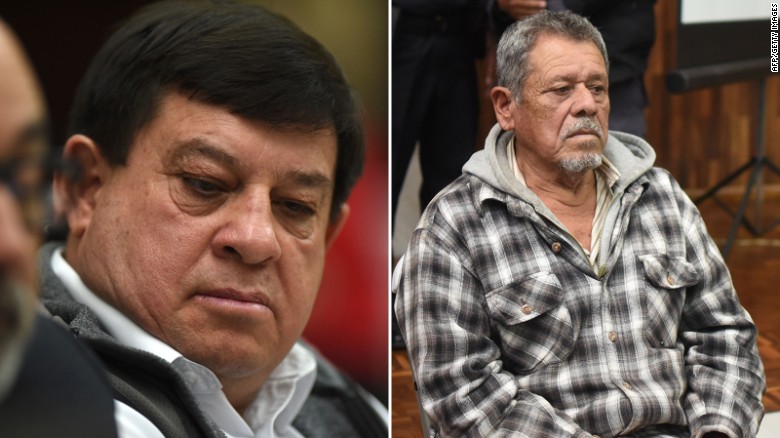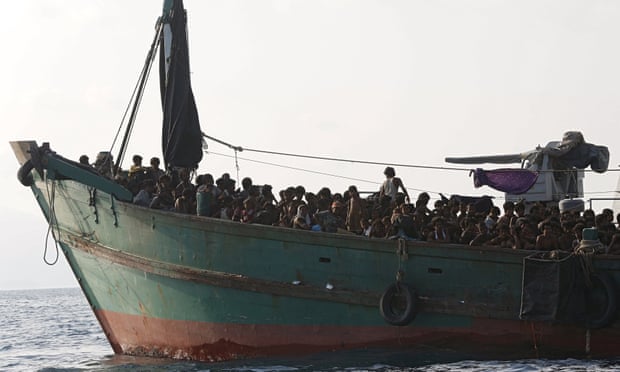Guatemala Convicts, Sentences Ex-Military Officers in Sexual Violence Case
By Samuel Miller
Impunity Watch Reporter, North America and Oceania
GUATEMALA CITY, Guatemala — A Guatemalan court has sentenced two former soldiers to 120 and 240 years of prison, respectively, for subjecting at least 15 indigenous women to sexual slavery and other crimes during the country’s civil war. Lt. Col. Esteelmen Francisco Reyes Giron received 120 years and military commissioner Heriberto Valdéz got 240 years during sentencing Friday.

It is the first time that a court in Guatemala has handed down a sentence for such crimes.
Giron, who was the commander of the Sepur Zarco military base, was found guilty of holding 15 women in sexual and domestic slavery and for killing one woman and her two daughters. Valdéz, a paramilitary who carried out commissions for the army, was convicted for the same enslavement, as well as the forced disappearance of seven men.
Yassmin Barrios, Chief Judge of the Court, announced in his decision, “We the judges firmly believe the testimony of the women who were raped in Sepur Zarco. Rape is an instrument or weapon of war, it is a way to attack the country, killing or raping the victims, the woman was seen as a military objective.”
The packed courtroom erupted in cheers and chants of “justice, justice!” when the ruling was read.
“These historic convictions send the unequivocal message that sexual violence is a serious crime and that no matter how much time passes, it will be punished,” said Erika Guevara-Rosas of Amnesty International. “It is a great victory for the 11 women who embarked on a 30-year-long battle for justice.”
During the hearings, 11 women from the indigenous Q’eqchis communities described how they physically and emotionally deteriorated while being raped and used as slaves for half a year. In court, many wore indigenous garb and had their faces covered.
Moises Galindo, the defense lawyer for Reyes Giron, said the trial “was a fabrication and that his client was never at the site of the crimes.”
The 120-sentence for Giron and 240-year sentence for Valdéz are in part symbolic as Guatemalan law limits the amount of time anyone can spend in prison to 50 years.
Guatemala’s 36-year civil war left more than 200,000 people dead or missing, according to the United Nations, which places most of the responsibility for wartime atrocities and excesses on the government forces.
Those who suffered most from the human rights violations committed during the war were the indigenous peoples.
For more information, please see:
BBC News – Guatemala: Rape sentences in landmark military trial – 27 February 2016
CNN – Guatemala sentences 2 ex-military officials for using women as sex slaves – 27 February 2016
ABC News – Guatemala Convicts Ex-Officer, Paramilitary in Slavery Case – 26 February 2016
Christian Science Monitor – Guatemala war crimes verdict breaks grip of impunity – 26 February 2016
Australia Illegally Forcing Return of Refugees – Amnesty International
By Samuel Miller
Impunity Watch Reporter, North America and Oceania
CANBERRA, Australia — Australia’s record of sending asylum seekers to Nauru and Manus Island in Papua New Guinea, as well as policies of mandatory detention, boat push-backs and soaring indigenous imprisonment rates have resulted in heavy criticism from Amnesty’s annual human rights report. For example, Amnesty International has found in its report Australia’s boat policy has acted as an example for other countries in the region to force asylum seeker boats back to sea.

The Australian High Court has recently declared the nation’s decision of sending 267 asylum seekers to Nauru detention centers as legal.
Australia stuck to the decision in spite of knowing about the harsh living conditions, violence, and abuses reported at the Nauru detention camps. Prime Minister Malcolm Turnbull defended his position by saying that the authorities want the nation to have secure borders.
“Our commitment today is simply this: the people smugglers will not prevail over our sovereignty. Our borders are secure. The line has to be drawn somewhere and it is drawn at our border,” said Turnbull earlier in February.
While global attention was focused on refugees migrating from the Middle East and Africa into Europe, forced migration across south-east Asia remained one of the most prominent rights abuses in the region. In May 2015 as many as 8,000 people were left stranded on boats at sea because south-east Asian countries such as Thailand, Malaysia, and Indonesia refused to let them land and, in some cases, towed their vessels back to sea.
Amnesty’s Australia national director, Claire Mallinson, said Australia’s policy of turning back boats to their countries of transit or origin was providing an example, and a justification, for other countries to do the same. “Last year we saw Thailand, Indonesia, Malaysia refusing to allow boats to land, or towing boats back to sea,” Mallinson said.
Mallinson went on to say, “In essence, what these countries are doing are copying Australia’s bad practice, and this raises real concerns for the region and the world. If you take that policy to its full conclusion, where boats are being stopped from landing, or where countries are closing their borders, then nobody would be safe, nobody could seek protection anywhere.”
“Australia has a proud record of defending human rights,” she said. “It helped form the UN, it helped draft the universal declaration on human rights, but before it can be that constructive player again, it needs to get its own house in order.
The report also condemned Australia’s treatment of its Indigenous peoples, and called on the government to set justice targets to reduce the over-representation of indigenous people in prisons.
For more information, please see:
Australia Network News – Australia Forcing Refugees to Leave? – 24 February 2016
CNN – Refugee crisis: ‘You see walking skeletons’ – 24 February 2016
Sky News Australia – Australia must improve human rights record – 24 February 2016